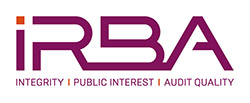IRBA issues notice of transparency reporting for audit firms
|
Johannesburg, Tuesday, July 31, 2018 – The Independent Regulatory Board for Auditors (IRBA) has issued a call for South African audit firms to produce transparency reports which provide insight into audit firm operations, governance, leadership, culture, ethics, audit quality, transformation, and audit engagements, amongst others. Says Imran Vanker, Director: Standards of the IRBA: “There is an increased need for clients of audit firms to have access to such information to support their long-term planning of the audit service and to support the tendering processes for audits ahead of rotating their audit firm. We hope that in the light of the level of scrutiny on audit firms that the profession embraces an attitude of disclosure and transparency which will contribute to restoring confidence in the audit quality and professionalism of auditors.” The move by the IRBA to seek publication of annual transparency reports, first considered by the IRBA last year, now coincides with a review of the International Auditing and Assurance Standards Board’s (IAASB) International Standard on Quality Control (ISQC) 1 which is currently being revised. Says Mr Vanker: “At a global level, the IAASB has recognised the role of communication of a firm’s quality management system, and current draft revisions of ISQC1 further recognise that a firm’s external reporting obligations could be established in law, legislation, or professional standards. While we await the publication of the new standard, the IRBA looks forward to local firms using this opportunity to learn and believes that early adoption will contribute to the maturing of systems and the evolution of transparency reporting ahead of regulation.” The IRBA has indicated that it may use the anticipated new ISQC1 as a basis for prescribing transparency reports and the required content; however, it has, in the meantime, issued a communique to auditors which outlines those areas it considers critical for its use in its oversight role, which includes elements that would be useful to audit committees. It has also provided a resource section on the IRBA website with local and global examples for the benefit of firms embarking on transparency reporting for the first time. It is anticipated that transparency reports will become an increasingly important tool for audit committees as the reports will provide a means to committees when assessing their options in the lead up to the effective date of 1 April 2023 for mandatory audit firm rotation. Transparency reporting is already mandatory in some jurisdictions such as the European Union, the United Kingdom, Japan, Australia and New Zealand, amongst others. Says Vanker: “Mandatory publication is usually required of firms that audit public interest entities (PIEs); however, the IAASB notes that firms are increasingly issuing publicly available reports. In South Africa, we have a few firms who have already published such reports on a voluntary basis in response to concerns from clients and in response to market developments in the last year. This will become a critical element to restore confidence in the auditing profession”. Ends More about the IRBA: The IRBA is a public protection statutory body established to protect the financial interests of the public by ensuring registered auditors and their firms deliver services of the highest quality. It upholds audit firm independence to ensure that audit quality is such that it enhances the accuracy and credibility of financial performance reporting. In this way, the IRBA has an important role to play in building the reputation of South Africa as an investment market for both local and global investors and driving economic growth for the country. The IRBA also registers suitably qualified accountants as auditors, who must adhere to the highest ethics standards, and promotes the auditing profession through the effective regulation of assurance conducted in accordance with internationally recognised standards and processes.
|





